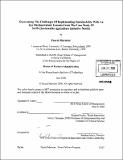| dc.contributor.advisor | Richard Locke. | en_US |
| dc.contributor.author | Marmier, Pascal | en_US |
| dc.contributor.other | Sloan School of Management. | en_US |
| dc.date.accessioned | 2009-01-30T16:46:23Z | |
| dc.date.available | 2009-01-30T16:46:23Z | |
| dc.date.copyright | 2008 | en_US |
| dc.date.issued | 2008 | en_US |
| dc.identifier.uri | http://hdl.handle.net/1721.1/44434 | |
| dc.description | Thesis (M.B.A.)--Massachusetts Institute of Technology, Sloan School of Management, 2008. | en_US |
| dc.description | Includes bibliographical references (p. 163-167). | en_US |
| dc.description.abstract | Sustainability has become an important management issue as an increasing number of corporate executives realize their companies are facing a period of disruptive change. Moving away from whether to act or not, most companies are now focusing on how to implement sustainability into their activities. This thesis explores the complexity of adapting current operations to more sustainable practices. The starting hypothesis is that corporate sustainability initiatives share similar dynamics to other innovation initiatives. A theoretical framework building upon the literature on innovation is applied to sustainability. The central focus of the thesis is a case study of the Sustainable Agriculture Initiative at Nestle ("SAIN"), a unique group that promotes sustainability throughout the upstream supply chain by applying business methods to the direct sourcing of agricultural raw materials. The challenges the SAIN team faces in implementing its activities are detailed and analyzed, in part by using models from system dynamics. The challenges range from Nestle-specific strategic issues, to the mental models of some of the players in the supply chain, and the perception of sustainability by managers and others in corporate functions. Successful actions that have helped the team overcome barriers to implementation, in particular by facilitating learning within Nestlé, are then analyzed. The thesis concludes with an analysis of related initiatives in the company, and with recommendations linked to the importance of communication, collaboration and the creation of a structure that brings together business thinking with a deep understanding of social, economic and environmental global issues. | en_US |
| dc.description.statementofresponsibility | by Pascal Marmier. | en_US |
| dc.format.extent | 167 p. | en_US |
| dc.language.iso | eng | en_US |
| dc.publisher | Massachusetts Institute of Technology | en_US |
| dc.rights | M.I.T. theses are protected by
copyright. They may be viewed from this source for any purpose, but
reproduction or distribution in any format is prohibited without written
permission. See provided URL for inquiries about permission. | en_US |
| dc.rights.uri | http://dspace.mit.edu/handle/1721.1/7582 | en_US |
| dc.subject | Sloan School of Management. | en_US |
| dc.title | Overcoming the challenges of implementing sustainability with an eye on innovation : lessons from the case study of SAIN (Sustainable Agriculture Initiative Nestlé) | en_US |
| dc.type | Thesis | en_US |
| dc.description.degree | M.B.A. | en_US |
| dc.contributor.department | Sloan School of Management | |
| dc.identifier.oclc | 294904362 | en_US |
